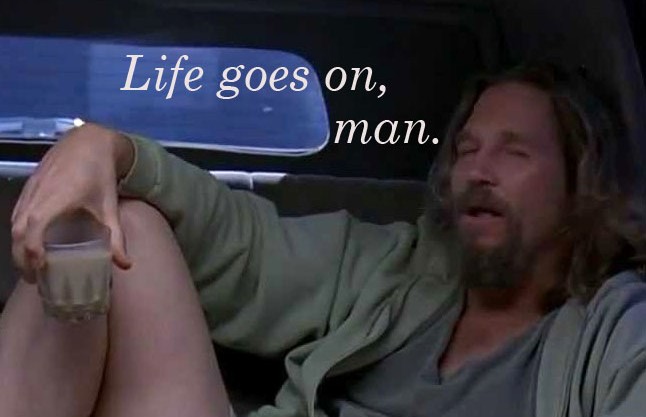The eminent philosopher Bertram Wilberforce Wooster once wrote,
I spent the afternoon musing on Life. If you come to think of it, what a queer thing Life is! So unlike anything else, don’t you know, if you see what I mean.
And how right he was, don’t you know.
Life is a word that presents itself to our minds as the the way to indicate everything, and especially everything that is happening. It’s a handy monosyllable of Anglo-Saxon stock, much shorter to say than “state of affairs” or “course of events” or “the way things are going.” It’s a verbal gesture, the spoken equivalent of waving an arm generally toward everything from here to the horizon: life.
As another eminent philosopher, Don Cupitt, says,
in the past few decades life has become our most popular totalizing word –by which I mean, the word we use when we want to talk about “it all” or “everything”– and various ‘life’ idioms have become the dominant form of religious language that is usable in public.
That insight –no less canny than Wooster’s, and perhaps even a bit cannier, if you see what I mean– is from Cupitt’s book simply entitled Life, Life (Santa Rosa, CA: Polebridge Press, 2003). It’s a short book, and the key to it is the 4-page appendix with its list of “Life-Idioms” that Cupitt collected while listening to people who tried, in everyday talk, to refer to “it all.” Here are just a few, in alphabetical order:
attitude to life
best things in life
control my own life
dear life
enjoy life
facts of life, full of life, feel alive
get a life, get more out of life, good life
hard life
in love with life
joy of life, just life
life is like that
mission in life, mystery of life
normal life,
pace of life, private life, purpose in life
quality of life
real life, religious life
secret of life, sex life, slice of life, story of my life, such is life
that’s life, time of your life
view of life
walk of life
yes to life
zest for life
Cupitt’s list is four pages long, and while he sometimes stretches to make the point, the list gets your attention and makes you start noticing how everybody around you is using the word life. as as “totalizing word” that is “usable in public.” In fact, if you “get into the habit of looking out for” the most “common and vivid life-idioms,” Cupitt predicts that “you will gradually begin to see how the whole of our worldview, our religion, and our morality are currently being reorganized around the idea of life.”
Life, that is, rather than the totalizing word that previous generations considered adequate to express themselves: God. Cupitt has his own theory of why we’ve started talking this way: the western world has lost its religion, the sea of faith has receded, we’ve taken leave of God, etc. In a potted history of western civ, Cupitt says that “by 1870 or so, in the work of certain major artists, life is emerging as the new religious object. It is within us, it is that in which we live and move and have our being, and it is also in a sense over against us.”
Over against us? Is life in some way transcendent, or merely super-immanent? It’s hard to say, because it’s not very rewarding to ask precise questions about popular usage. Cupitt writes as one who no longer believes in God, and who has transferred his allegiance over to life in this modern sense. It’s very interesting to hear his contrast between God and life as totalizing terms. The differences between them
arise from the fact that the ‘omni’ attributes of God come out quite differently from those of life, because God is (or was) transcendent, simple, unmixed perfection, and sovereign over all things; whereas life is finite, temporal, immanent and all-inclusive. God is pure holiness and goodness, whereas life is baggy and shapeless, and includes all the opposites –bliss and wretchedness, comedy and tragedy, fullness and emptiness, good and ill, holiness and profanity, all bundled together in one great package. The result is that saying ‘Yes’ to life is markedly different from saying ‘Yes’ to God. When we say ‘Yes’ to life we say ‘Amen’ to all of it as a package deal, and thereafter the so-called Problem of Evil does not arise. We are required to renounce the victim psychology and the old impulse to complain about being unfairly treated.
Those who say ‘Yes’ to God, on the other hand, take sides.
Cupitt tries hard to make “life minus God” sound bigger than “God plus everything created:” even though for him life is “finite, temporal and contingent,” it is “a single, immanent, continuous whole of which we are seamlessly part. It is outsideless. Life is, simply, everything.” But it’s a hard sell: even if Cupitt were right and there were no God, it would be best to admit that life got smaller when God left.
But taking leave of Cupitt, many fascinating implications can be drawn from the usage of life that he has documented. It really is worthwhile to begin noticing how life has proliferated and invaded so many nooks and crannies of everyday usage. When I hear non-believers say it, I now understand that they are making a gesture towards everything, at least the biggest everything of which they can conceive. And when I hear believers say it, I wonder if they are aware of having opted for a more publicly acceptable totalizing term on purpose, or if they have a tendency to conceive of the full course of events as life before then considering how it may be related to God. And when I use it myself, I catch myself asking if I really mean life, or if I sometimes really meant God but failed to say so.
How about you? How’s life treatin’ ya?
